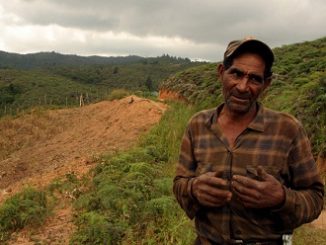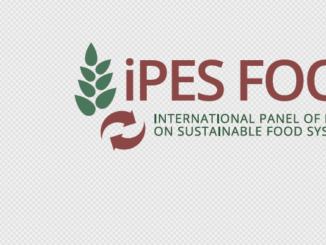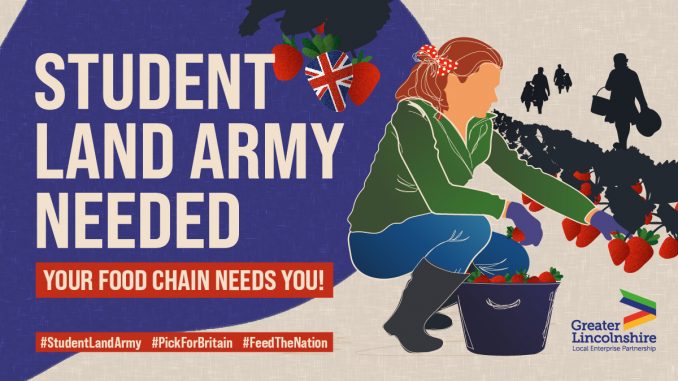
Brexit and the Covid crisis have yielded easy pickings for the far right. Nationalistic narratives have co-opted the ‘eat local’ language of the agri-food movements. But the populist rhetoric is propped up by backroom trade deals that threaten to cripple the UK’s small farmers. In the first of a two-part series, Anoushka Zoob Carter unpacks how new forms of nationalism are exploiting a broken food and farming system.
Nationalistic fervour is visibly on the rise across the world. A lesser known trend, but no less concerning, is the appropriation of agricultural issues by the far right.
In Brexit Britain, farmers were assured the UK’s agriculture sector would be better off out of the EU. A ‘Green Brexit’ committed to reviving the British countryside – a symbol of nationalistic pride to many.
But nationalism fails to fix the problems brought by neoliberal globalised capitalism. Instead it enables the ruling elite to continue with business as usual behind the scenes. Flags cannot guarantee a just food future for the UK.

Co-opting aspects of agri-food movements
Rural populism and support for nationalistic politics is not a new phenomenon. As Natalia Mamonova has pointed out, both Mussolini and Hitler won their first mass following in rural areas. The British Union of Fascists (BUF) in the early 1900s claimed that independent family-run and self-sufficient farms were the gatekeepers of traditional rural life.
Today, the United Kingdom Independence Party (UKIP) points the finger at urban elites for the erasure of traditional rural ‘culture’, and blames the EU for funnelling vast subsidies into the pockets of wealthy landowners. UKIP’s support for trade deals and cheap food imports, however, undermines its commitment to smaller scale farmers.
UKIP’s populist rhetoric reflects the wider trend in European populist nationalist movements which frames the ‘rural’ citizen, often a farmer, as disenfranchised by the elite. This is visible in Spain, where some farmers have called out the ‘urbanites’ who ‘write regulations from their offices in the cities without having set foot in the countryside’. This may not be full frontal fascism but it shows how populism is applied to agricultural struggles.
In the UK, it is worrying to see how far-right actors easily co-opt aspects of agri-food movements typically interpreted as a diagnosis for a just food system. Localism, for example, is a scale-based movement with transformative potential to shift how society interacts with and values food economies. Whilst localism can offer progressive emancipatory rural politics, its patriotic iterations can manifest as a “breeding ground for regressive political forces”.
The newly established ethnonationalist group Patriotic Alternative has compiled a list of action points for becoming a true nationalist – number one: buy British products wherever possible, especially food.
Fear of foreign food can arise in other, seemingly jovial ways, too. Disgruntled cattle farmers in the Vale of Lune Young Farmers’ Club shared a video on social media that theatrically critiqued the sale of Polish mince in supermarkets for threatening national beef production during the onset of the corona0virus pandemic.
Whilst it is true that promoting domestic food production is key for transforming the food system, a whole host of contradictions arise when nationalism becomes its main campaign tool.
Food security has been granted renewed importance in the new Agriculture Bill which will facilitate, and increase monitoring of, domestic food production.
Even before Coronavirus took hold, the Land Worker’s Alliance had warned of the vulnerable state of the British food system (47% of the UK’s total food supply and 82% of all its fresh fruit is imported). Despite this, it took a head-on collision between Brexit and COVID-19 to make visible the troubled concept of a bordered nation when it comes to labour and food security.
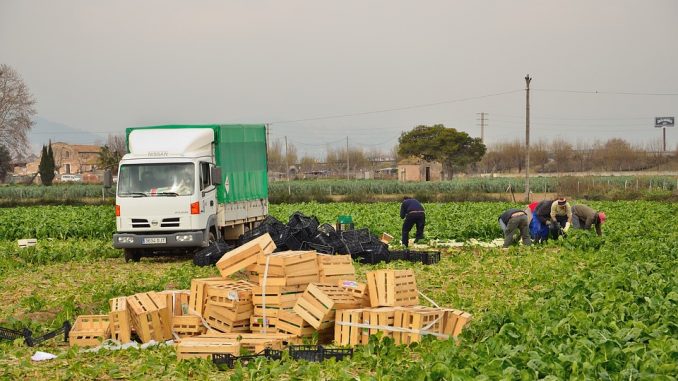
Pick For Britain
In spring 2020, ‘Feeding the Nation’ became a repeated media headline. In bid to spur patriotically-minded Britons to take to the fields and salvage fruit and vegetables that were close to ruin, the government rustled up the Pick for Britain campaign endorsed by Prince Charles.
Meanwhile the UK’s largest salad producer, G’s Fresh, ran a recruitment campaign targeting anyone from students to self-employed workers and laid-off hospitality staff to harvest fresh produce.
Interestingly, UKIP in its 2019 Manifesto had framed the country’s reliance on ‘foreign labour’ as a reason to ‘incentivise more British students and young people to pick the harvest during their summer holidays’.
When crisis struck however, nationalism struggled to coherently solve the question of labour in food production. The ‘Land Army’ recruitment campaign had little success. It became clear that this sort of nationalistic policy making is undermined by the neoliberal economic system upon which the nation relies.
Shortly after stumbling out of the EU, as promised the Conservative government established a new points-based immigration system. Seasonal agricultural workers, labelled as ‘unskilled’ or ‘low-skilled’, were erased from the desirable list of immigrants. However, drastic cuts to the number of visas permitted for agricultural labourers left Britain with tens of thousands fewer people to work the land.
As Coronavirus descended in March, the government awarded farm workers ‘key worker’ status. Rather than a shift in attitudes towards migrant agricultural workers, however, this was a clear move to allow agri-capital to continue unfettered. Large industrial farm operators were now able to legally circumvent international COVID-19 regulations because crisis agri-capitalism facilitated charter flights to bring in Romanian and Bulgarian labourers to work the fields – what one airline director termed “a completely new line of business”. Borders can bend, but only for those who perform as cheap bodies of labour to keep agri-capital flowing.
In the Pick For Britain campaign video Prince Charles lauded Britain’s farmers and growers for the hard ‘graft’ of producing the nation’s food. But the campaign failed to mention the kind of people who have been targeted by the immigration-centred Brexit campaign.
Even though farmers and food producers are labelled as critically important to the ‘lifeblood’ of the nation, the National Farmers Union constructs ‘farmers’ as those with land and capital; not the migrant or land-less labourers who work to make many farms productive.
Similarly, in Spain, the far-right party Vox frames farming as a patriotic duty, but their political praxis labels agricultural workers as un-Spanish.
Marginalising migrant farm workers from the idealised identity of a desirable ‘farmer’ reinforces the portrayal of immigration in nationalist discourse as a threat to a country. In actual fact, this ‘threat’ refers to the movement of people whose appalling living conditions are unacceptable outside of a pandemic, let alone in one.
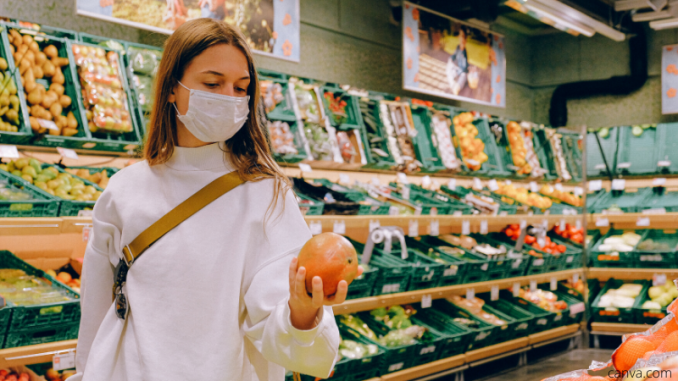
Corporate control
Nationalism has also recruited another actor in the agricultural system: supermarkets. The intersecting of EU and COVID-19 has reiterated the state’s dependency on corporate control over availability and access to food. Rather than the British establishment’s tradition of depending on the Empire to provide, the corporate regime shifts this role onto supermarkets.
George Eustice, Secretary of State for Environment, Food and Rural Affairs, stated that the government had listened to the ‘powerful arguments’ of the UK’s biggest supermarkets and ‘will do whatever it takes to help them feed the nation’. Not only does this confirm that we live under the reign of a corporate food regime but it appears that in time of crisis, the nation and agri-capitalist monoliths generate a nuanced genre of nationalism: corporate agri-nationalism.
The government continues to implore the public to Back British Farming in supermarkets, meanwhile supermarkets decorate their aisles with Union Jacks. It thus appears that the agri-giants of food systems (not just in the UK but across Europe) benefit the most from the consumption of economic nationalism. This begs the question: where exactly was this level of support for individual farms and their enterprises that were, and still are, most vulnerable during this perilous time?
Supermarkets are both the product and suppliers of neoliberal agri-capital and their very existence is predicated on the demand and supply of detrimentally cheap food. However, rather than working to address this after escaping the ‘straitjacket of the CAP’, the Conservative government seems to be on a one-way ticket to undemocratic trade deals with the US with disastrous effects on small-scale farmers. These could very well further the appropriation of agricultural issues by right-wing politics.
In fact, Patriotic Alternative has described the supermarket as ‘a mercantile invention that destroyed traditional local businesses and placed most of our food supply into the hands of those who only seek profit’. Meanwhile, the Chairman of the Brexit Party (now called Reform UK) has been lobbying Boris Johnson to deploy a Buy-British food campaign. These examples are just a couple among a growing landscape of dangerously exclusionary iterations of localism.
Conclusion
Whilst agri-food issues can be easily appropriated for regressive nationalist causes, the true colours of the flag of a Brexit-ridden Britain are clear; nationalism doesn’t feed people.
The common explanation for the Brexit vote is that it was a cultural response by those ‘left behind’ by neoliberal governance. But upon inspecting the nationalism of the Conservative government, it is clear that theirs is not a struggle against neoliberalism by any means. Instead, the government is using nationalism to placate the masses whilst continuing with business as usual behind the scenes.
Additionally, whilst ‘localisation’ is often touted as a progressive prognosis for the ills of globalisation, it can make invisible and further marginalise those people who don’t fit into the (racialised) image of a British farmer.
This calls for more active resistance to harmful cultures of exclusion and prejudice that may be creeping into ongoing movements to transform our currently defunct nationalist agri-corporate food regime.
In part two of this series, Anoushka Zoob Carter explores the phenomenon of technological nationalism in post-CAP politics, and the conflicts it is generating between advocates of rural renewal and of an emancipatory rural politics.
More on right-wing populism
Framing Farming – Nationalism, Food Security and Food Sovereignty
More on Brexit
Book Serialisation | Creating a New British Farming Food and Rural Policy
Post-Brexit Food, Farming and Fair Trade | Food safety and labelling
Post-Brexit Food, Farming and Fair Trade | Environment and Animal Welfare
Post-Brexit Food, Farming and Fair Trade | Migration and Trade



